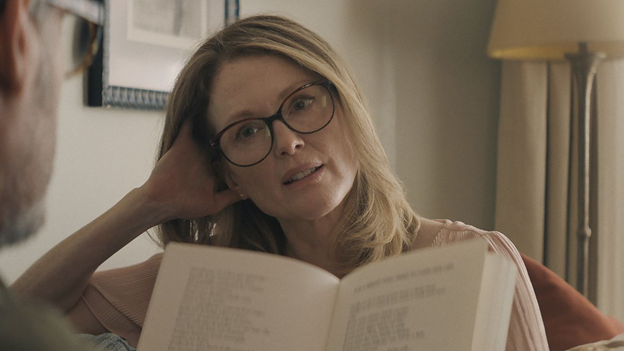A brief aside: back when director Sebastian Lelio screened the trans-positive drama A FANTASTIC WOMAN at 2017’s AFI Fest, our film section editor remarked that the film ticked all the boxes for mainstream US appeal. His joking observation was that “John Turturro was sitting a row ahead of me, maybe he’ll play the deceased boyfriend [in the remake].” Well, as the history books show, Lelio went on to win an Oscar for A FANTASTIC WOMAN, and though a remake doesn’t appear to be on the horizon (yet), Lelio is back with a new film, and guess what, it co-stars John Turturro! But I digress, on to the main event!
All too often, films about divorced women place heavy emphasis on the idea that it’s never too late to find love. While that brand of rom com is excellent for wine night with the girlfriends, it is nice to see a story about an older, single woman who has character traits beyond “lonely.” GLORIA BELL is an intricate portrait of Gloria (played by Julianne Moore), a woman who has been divorced for 12 years. Gloria’s life is full of frustrations, between her mentally unstable upstairs neighbor, job insecurity, and the mysterious sphinx cat that continues to wander into her home (which could be some kind of symbolism, but it remains unclear). More than anything, Gloria loves to go out and dance, and it’s at a nightclub where she meets her new romantic partner, Arnold (John Turturro), who falls for her a little too fast. As she struggles to maintain relevance in the lives of her adult children (Michael Cera and Caren Pistorius) and to integrate an emotionally stunted Arnold into her life, more and more of Gloria’s outlook on life is revealed.

You’re never too old to wake up hungover in Vegas
GLORIA BELL is director Sebastian Lelio’s recreation of his own 2013 film GLORIA, in which the plot is essentially the same, but the original is set in the director’s home country of Chile. American versions of foreign films are at risk of feeling hollow with the removal of cultural context, but GLORIA BELL, being set in Los Angeles, stands well on its own. The film follows Gloria through every facet of her life, and not one facet is missed. Gloria is the focus of every single frame, and we don’t leave her for a second. Seeing her every thought pass over her face and being a fly on the wall for every car radio sing-along and awkward phone message helps the character come alive in the subtlest of ways. A mostly quiet but enamoring performance by Julianne Moore gives glimpses into the character’s reflections on her past, her deepest hopes and desires.
Gloria is a mother, a single woman, a daughter, and an ex-wife, and through the constant observation of her that the film provides, it becomes clear that each of her roles in life have defined characteristics that she switches between. Each person in her life only sees her in one way, and when those roles overlap, it causes some discomfort in her relationships. When Arnold sees her with her children and ex-husband for the first time at her son’s birthday dinner, her independence and free-spiritedness on display, it becomes unclear whether or not he is up to the task of accepting every part of her. The birthday dinner scene is a highlight, hilariously smacking together wildly different personalities and showing the excellent chemistry this great cast has.

When you’re more turned on by the poem than the guy
The beautiful part about GLORIA BELL is that there is never a question as to what big thing is needed to turn Gloria’s life around. Life happens and she lives it—she’s a woman who knows what she wants and isn’t afraid to speak up and call people out on their insensitive behaviour. But within that is also a woman who gets deeply hurt by the sting of rejection and feels the pain of growing apart from her children. Much of how she lives can be summed up to her response to the question “Are you happy?,” to which she says sometimes she is and sometimes she’s not, just like anybody else. To be able to fall back into the feeling of joy whenever possible is the wonderful ability Gloria carries with her, and it is the lifeblood of this story. Gloria may not always be happy, but she is free, and seeing her experience that freedom is an absolute thrill.
There is something special about such a careful and loving character study such as this one; a welcome departure from Lelio’s more provocative (and rather unsuccessful) previous outing, DISOBEDIENCE—and to a lesser extent, even A FANTASTIC WOMAN. It is particularly great to see mundanity and quiet moments brought alive and made so engaging, especially while emphasizing a demographic that isn’t always given such close attention. Lelio does a phenomenal job portraying a woman who is sexual and outspoken, but simultaneously introspective and questioning. It’s the kind of film that gets you thinking about life and what is worth our time, but when those thoughts get overwhelming, leads you to the dance floor.















Comments